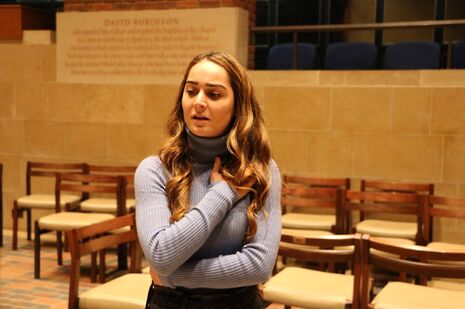Spring Awakening preview: ‘a dark coming-of-age tale’
Spring Awakening may seem like a classic study of adolescent angst but this production aims to be a topical broader social critique

In Cambridge, the sun is finally shining, the birds are singing, the daffodils and snowdrops are emerging – the arrival of spring it seems, is imminent. Spring is also coming to Robinson’s Brickhouse Theatre in the form of Sheik and Sater’s adaptation of Frank Wedekind’s Spring Awakening, a folk-rock musical (yes, really) set in late nineteenth-century Germany. A dark coming-of-age tale, it follows the lives of Melchior, Wendla and Moritz as they cross the threshold of childhood into an adult world they have been ill-prepared to deal with. Regarded by many as one of the most dynamic and exciting modern musicals, I spoke with the show’s director, Martha O’Neil, and members of the cast about their experience of putting on such a complex, and at times challenging, show.
On first reading, the musical looks like a classic study of adolescent angst. The themes it grapples with read a bit like a checklist for troubled teens: growing up too fast, or not growing up fast enough; bad sex and all its traumatic consequences; attempting to communicate with one’s parents and failing (spectacularly). You, the reader, yawn condescendingly: “Been there, done that, sorry. Next!”.
O’Neil, however, insists that the musical has far more to say, and this is why she has chosen to direct it. One of the themes often overlooked, she said, is that of “the intergenerational divisions” which fracture the lives of the characters, as they fail to understand or even listen to each other. Though Spring Awakening focuses on the lives of a few individual young people, it offers a far broader critique of the intellectual and moral hypocrisy of the communities and institutions which should have, but failed to, nurture them.
In the wake of #MeToo and Time’s Up, O’Neil suggests that the Spring Awakening also opens up a challenging space in which we can reflect on, and re-emphasise, the potentially devastating effects of imbalances in power and knowledge capital when it comes to sex and intimate relationships. One of her most difficult directorial decisions, she said, was how to stage the musical’s rape scene. Choosing ultimately to foreground its non-consensual aspect, the hope is that audiences can challenge their own preconceptions, particularly as to who might be the perpetrators of sexual assault. Melchior is, in some senses, the hero of Spring Awakening – cultured, mature, urbane, he seems like the least likely possible culprit of such a heinous act. The recent allegations leveled at Aziz Ansari suggest that this issue – of the intellectual and moral hypocrisy of ostensibly progressive men – remains very much a live one, and is an issue that Spring Awakening gazes unflinchingly into the eyes of.
Sitting in on a rehearsal, it is clear that the cast is committed to tackling such difficult themes with sensitivity and careful scrutiny. Alex Hancock, who plays Moritz, emphasised that given the emotional complexities of his character, portraying his character “as truthfully and respectfully as possible” was hugely important to him. Jonathan Iceton, who plays Melchior, added that “we've all spent a lot of time talking about characterisation to really get to grips with characters and what they're feeling to best convey this in the scenes”. Several cast members described the rehearsal space as one that felt genuinely safe and supportive, reassuring given the disturbing nature of some of the scenes. Technically, the cast seems very good indeed, as strong voices are complemented by considered and capable acting. Although the show is dark, it is also an elegant and poignant exploration of the passions and joys of being young. The cast does justice to Sheik and Sater’s emotionally resonant score and lyrics, bringing a promising level of dynamism and responsiveness to their performance.
If you are looking for a thought-provoking, moving and morally complex musical experience, Spring Awakening promises to deliver on all three counts. While it deals, in some ways quite brutally, with the loss of innocence and its devastating consequences, it raises valuable if difficult questions about our own times, and the ways in which whole communities may be complicit in abuse. Today that remains, unfortunately, a question of particular urgency.
Spring Awakening is on at the Robinson Auditorium, 20-24 February
 News / CUP announces funding scheme for under-represented academics19 December 2025
News / CUP announces funding scheme for under-represented academics19 December 2025 News / SU reluctantly registers controversial women’s soc18 December 2025
News / SU reluctantly registers controversial women’s soc18 December 2025 News / Cambridge welcomes UK rejoining the Erasmus scheme20 December 2025
News / Cambridge welcomes UK rejoining the Erasmus scheme20 December 2025 Features / Should I stay or should I go? Cambridge students and alumni reflect on how their memories stay with them15 December 2025
Features / Should I stay or should I go? Cambridge students and alumni reflect on how their memories stay with them15 December 2025 Film & TV / Timothée Chalamet and the era-fication of film marketing21 December 2025
Film & TV / Timothée Chalamet and the era-fication of film marketing21 December 2025









